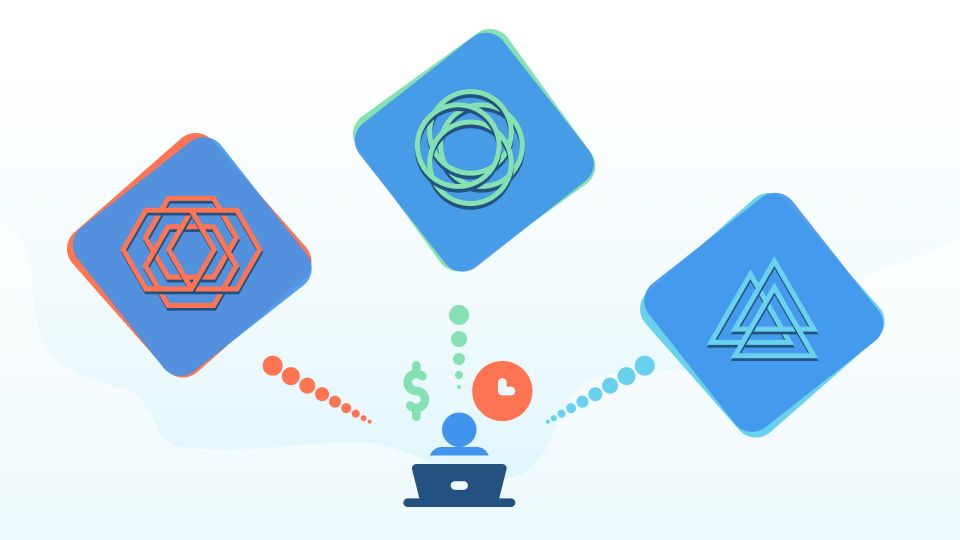
Blockchain is now an essential tool for enhancing data integrity and security, driving operational efficiency, and enabling automation in organizations across the globe. If your enterprise is looking to leverage blockchain technology, choosing the right blockchain protocol that supports your specific goals and needs is critical to get real value out of your blockchain project.
Blockchain protocols are sets of rules and guidelines which determine how the blockchain’s distributed ledger is managed, contracts are executed and transactions are validated. Because blockchains are decentralized, blockchain protocols are distributed to the entire network to eliminate the central authority and ensure the protocols are secure. This means blockchain protocols can’t be altered once they are created. Choosing the best blockchain protocol for an enterprise can be overwhelming for someone new to the blockchain space.
Given the nature of protocols, it’s important to have a full understanding of your goals before getting started so you don’t run into problems later in your blockchain development project. This article takes you through the essentials of enterprise blockchain protocols, factors to consider when choosing a blockchain protocol, important use cases, and a list of the leading enterprise blockchain protocols and their key features.
Blockchain can become an integral part of your enterprise technology stack and offer new ways to engage with your customers and streamline existing business processes. This is transformational technology, but you can’t find a suitable blockchain protocol until you identify the main goals of your blockchain development project. Blockchains help businesses meet the following modern-day business demands:
Blockchains offer a digital platform for processing and coordinating information. Blockchain platforms perform modern business functionalities that go far beyond traditional information processing. The distributed ledger technology and consensus mechanism enable more well-organized data coordination than centralized or paper-based systems.
Blockchain’s unique design digitizes trust and agreements besides procuring immutable records of transactions that all participants of the network trust. Programmable smart contracts have automated business logic and simplified the alignment and reconciliation of records across intricate business networks.
The ability to digitize goods and assets and the built-in tokenization capabilities of blockchain technology have enabled enterprises to create, issue and manage a wide variety of digital assets. The list of assets includes non-fungible tokens (NFTs), fractionalized real estate, and central bank digital currencies (CBDCs). Different varieties of distributed ledger technologies (DLT), open-source blockchains, and proprietary blockchains exist to offer digital asset solutions.
Read More: 4 Factors of Success with NFT Marketplace
Some factors to consider when choosing an appropriate blockchain framework for your business include:
Blockchain protocols dictate how data is structured so systems can accept it besides safeguarding it from malicious users. Since selecting a properly developed blockchain platform determines the functionality of blockchain software, having an in-depth understanding of the best blockchain protocols is essential. Following is a list of the leading protocols preferred by enterprises for secure blockchain platforms.
Developed by the Linux Foundation, Hyperledger is an open-source blockchain focused on helping enterprises efficiently address their most complex and critical issues. Hyperledger enables developers, businesses, and enterprises to integrate DLT in various use cases.
Users can create custom blockchain applications for industry-specific business requirements. For example, the fabric v2.0 update brings new agile features for users and operators, including enhanced governance for smart contracts, support for new privacy patterns and applications, and enhanced options for operating nodes. Each v2.x minor improvement reloads the v2.0 release with new features, modifications, and bug fixes. There are currently over 260 organizations working towards creating an industry-grade enterprise solution.
Some big brands supporting Hyperledger include JP Morgan, Samsung, Fujitsu, IBM, SAP, and American Express. Some of the most significant features that make Hyperledger so attractive include:
The Ethereum open-source platform facilitates the creation and deployment of decentralized applications (DApps) that support smart contracts – transaction agreements that eliminate the involvement of intermediaries. Ethereum excels in the realm of sending and receiving assets worldwide and the development of safe and secure apps used in gaming and financial service.
Apart from taking advantage of Ether (ETH) as a cryptocurrency to pay for computational and transaction fees, the Ethereum protocol enables businesses to create large-scale apps and build proprietary variants that utilize the latest Ethereum code. Some critical features of Ethereum include:
The Corda open-source project excels in blockchain interoperability and offers top-notch privacy for enterprises creating blockchain networks. Users can create blockchain networks that synchronize management and transactional records and agreements.
Corda helps streamline business operations by providing time-stamping services to reduce record-keeping costs and eliminate future issues and complexities. The protocol facilitates the execution of transparent agreements and transactions. Smart contract logic authenticates transactions strictly based on the contract note. The protocol’s main features include:
The Quorum blockchain protocol is an open-source blockchain specifically designed for enterprises in the financial sector. Built on the Ethereum framework, it is projected to become a significant enterprise blockchain protocol that could support the development of third-party apps and in-house tools.
The developers have used a consortium approach such that only permissioned members can access it, thereby ensuring the privacy of transactions. The protocol is maintained by a permissioned network comprising the Enclave module, Transaction Manager Module, and Quorum Node. Its best features are:
Choosing the correct protocol before implementing a blockchain development project is critical because it will define the functionality of your platform. The best blockchain protocol for your enterprise must ultimately depend on the size and nature of your operations. Selecting protocols can be an extremely complex issue. It would be best for businesses looking to implement blockchain protocols to have excellent blockchain development service providers who can also help with secure deployment and maintenance of the solutions.